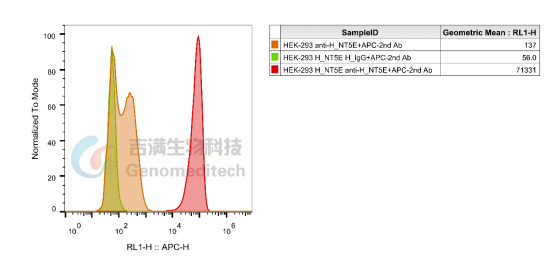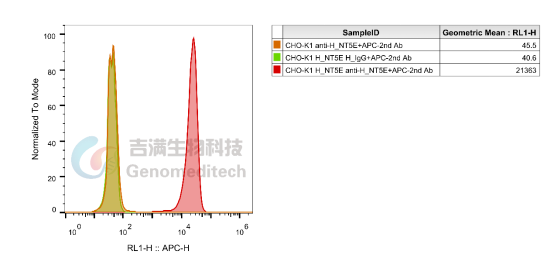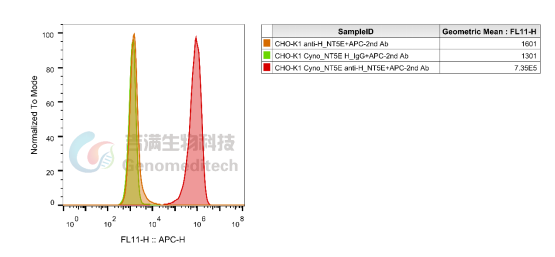Cat. No:GM-28674AB
Product:Anti-H_NT5E(CD73) hIgG1 Antibody(Oleclumab)
Cat. No:GM-28674AB
Product:Anti-H_NT5E(CD73) hIgG1 Antibody(Oleclumab)
GM-28674AB-10 10 μg
GM-28674AB-100 100 μg
GM-28674AB-1000 1mg
Species Reactivity Human; Cynomolgus
Clone Oleclumab
Source/Isotype Monoclonal Human IgG1 /λ
Application Flow cytometry
Specificity Detects NT5E
Gene NT5E
Other Names CALJA, E5NT, NT, NT5, NTE, eN, Ent, CD73
Gene ID 4907 (human); 102114976 (Cynomolgus)
Background 5′-nucleotidase (5′-NT), also known as ecto-5′-nucleotidase or CD73 (cluster of differentiation 73), is an enzyme that in humans is encoded by the NT5E gene. CD73 commonly serves to convert AMP to adenosine. NT5E (CD73) is a surface enzyme which is expressed on multiple cells. This enzyme mediates the gradual hydrolysis of the autocrine and paracrine danger signals of ATP and ADP to anti-inflammatory adenosine. Immune suppression mediated by adenosinergic pathways is very important for maintaining immune system homeostasis. Immune suppressive functions of T regulatory cells are also dependent on CD73 expression. Treg's generally suppress the immune response. They affect proliferation and function of T cell. CD73 also occurs on anergic CD4 + T cells, thereby maintaining self-tolerance to healthy tissues as well as protecting the fetus from the mother's immune system during pregnancy. Also described was adenosine generated by NT5E, which limits the inflammatory immune response by negative feedback in neutrophil which express the adenosine receptor. NT5E can act as an immune inhibitory control molecule. Free adenosine generated by NT5E inhibits cellular immune responses and thereby promotes immune escape of tumor cells.
Storage Store at 2-8℃ short term (1-2 weeks).Store at ≤ -20℃ long term. Avoid repeated freeze-thaw.
Formulation Phosphate-buffered solution, pH 7.2.
Endotoxin < 1 EU/mg, determined by LAL gel clotting assay



Cat. No:GM-28674AB
Product:Anti-H_NT5E(CD73) hIgG1 Antibody(Oleclumab)
GM-28674AB-10 10 μg
GM-28674AB-100 100 μg
GM-28674AB-1000 1mg
Species Reactivity Human; Cynomolgus
Clone Oleclumab
Source/Isotype Monoclonal Human IgG1 /λ
Application Flow cytometry
Specificity Detects NT5E
Gene NT5E
Other Names CALJA, E5NT, NT, NT5, NTE, eN, Ent, CD73
Gene ID 4907 (human); 102114976 (Cynomolgus)
Background 5′-nucleotidase (5′-NT), also known as ecto-5′-nucleotidase or CD73 (cluster of differentiation 73), is an enzyme that in humans is encoded by the NT5E gene. CD73 commonly serves to convert AMP to adenosine. NT5E (CD73) is a surface enzyme which is expressed on multiple cells. This enzyme mediates the gradual hydrolysis of the autocrine and paracrine danger signals of ATP and ADP to anti-inflammatory adenosine. Immune suppression mediated by adenosinergic pathways is very important for maintaining immune system homeostasis. Immune suppressive functions of T regulatory cells are also dependent on CD73 expression. Treg's generally suppress the immune response. They affect proliferation and function of T cell. CD73 also occurs on anergic CD4 + T cells, thereby maintaining self-tolerance to healthy tissues as well as protecting the fetus from the mother's immune system during pregnancy. Also described was adenosine generated by NT5E, which limits the inflammatory immune response by negative feedback in neutrophil which express the adenosine receptor. NT5E can act as an immune inhibitory control molecule. Free adenosine generated by NT5E inhibits cellular immune responses and thereby promotes immune escape of tumor cells.
Storage Store at 2-8℃ short term (1-2 weeks).Store at ≤ -20℃ long term. Avoid repeated freeze-thaw.
Formulation Phosphate-buffered solution, pH 7.2.
Endotoxin < 1 EU/mg, determined by LAL gel clotting assay


